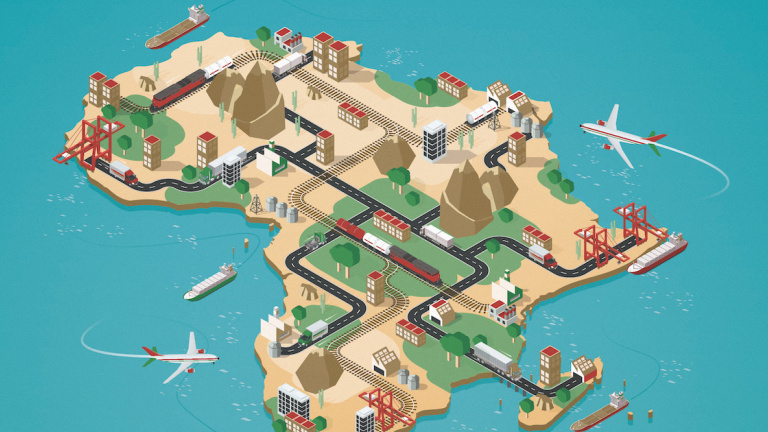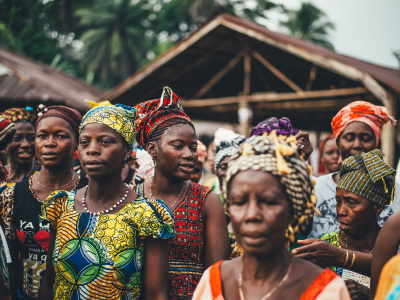
ECOWAS and the role of the RECs in AfCFTA implementation
Africa’s RECs are meant to be the building blocks for the AfCFTA. ECOWAS and the other RECs will therefore have a key role to play in supporting the finalisation and implementation of the AfCFTA Agreement.
The RECs as building blocks for the AfCFTA
African countries are establishing the African Continental Free Trade Area (AfCFTA), the world’s largest regional trading arrangement by membership. But the AfCFTA will not replace Africa’s existing regional economic communities (RECs). In fact, the AfCFTA Agreement explicitly recognises the RECs as building blocks for the AfCFTA. Furthermore, the agreement envisages that RECs that have already achieved deeper integration – as is the case for the Economic Community of West African States (ECOWAS) – will continue to apply their regional trade regimes for intra-regional trade. Given that the majority of intra-African trade is conducted within RECs, these institutions will continue to play a central role in the African trade landscape. They will also contribute to the finalisation, implementation and application of the AfCFTA.
ECOWAS and the AfCFTA negotiations
ECOWAS has played a key role in the AfCFTA process. Though the AfCFTA was negotiated by individual states, the ECOWAS common external tariff (CET) provided the basis for the ECOWAS member states’ tariff negotiations under the AfCFTA. Furthermore, the ECOWAS Commission supported its member states during the negotiations and was pivotal in coordinating their positions in the negotiations. In doing so, it was able to build on various technical and capacity building activities aimed at creating a common position for the region on external trade matters.
The ECOWAS Commission also participated in a broad range of regional consultations on the AfCFTA, including with the private sector and civil society organisations. Indeed, ECOWAS mechanisms for engaging the regional private sector have helped consolidate the interests of private sector actors and facilitate the development of ‘regional positions’ on the AfCFTA.
Regarding the AfCFTA services negotiations, the ECOWAS Commission will continue to support its member states. Here the Commission can draw on the regional services policy review it conducted, which highlighted areas of common interest and priority services sectors in the ECOWAS region.
Supporting AfCFTA implementation
Beyond the negotiations, ECOWAS will play an important role in the implementation of the AfCFTA Agreement. For this, the Commission can use its existing instruments and mechanisms, such as the Task Force on the Free Movement of Persons and Goods. ECOWAS initiatives relating to infrastructure projects and customs reforms will be instrumental in facilitating the free movement of goods within the AfCFTA. Key among these will be finalising the dual-carriage highways along the Abidjan-Lagos corridor and removing obstacles to trade along this route by implementing reporting mechanisms.
The ECOWAS Commission, moreover, can support its member states in harmonising customs practices through its regional revised customs code. It can also promote the use of its non-tariff barrier (NTB) reporting mechanism and related institutional structures that are part of the ECOWAS free trade area. In particular, the Commission can support introduction of the AfCFTA NTB reporting mechanism by ensuring that it is aligned with West Africa’s existing NTB reporting mechanism and institutional structures.
Thus, it is expected that while the AfCFTA provides the overarching framework for trade between African states, regional organisations like ECOWAS will provide many of the key structures and institutions to support intra-African trade. They will also remain relevant in their roles beyond trade and economic integration, including on governance, mobility, health and other themes.
The experience gained by ECOWAS member states during the adjustment period for implementation of the ECOWAS CET has provided them with an indication of some of the expected effects of trade liberalisation under the AfCFTA. West African trade associations at the regional and national levels like the Fédération des Associations des Industriels de l’Afrique de l’Ouest (FAIAO) and the Manufacturers Association of Nigeria are reassured by the fact that ECOWAS has various regional trade defence mechanisms that it can use to protect regional businesses. The ECOWAS Commission is instrumental in this process, as the notifications for activating these measures are deposited with the Commission.
Building national capacity
ECOWAS will play a key role in supporting training and development of national customs administrations to enforce AfCFTA rules. Given that the AfCFTA will introduce continental rules of origin which will need to coexist with ECOWAS’s own rules of origin, efficient border control measures will need to be implemented to avoid trade deflection. This is important for ECOWAS member states, as full implementation of the ECOWAS customs union and uniform application of the ECOWAS CET have not yet been achieved. The ECOWAS Commission can provide national customs administrations with relevant training on how to implement these two sets of rules of origin to facilitate efficient customs clearance procedures at borders.
Mediating disagreements
RECs are important for the successful implementation of the AfCFTA Agreement not only because of their ability to coordinate negotiating positions and provide support to member states for implementation, but also because they can mediate disagreements between member states. Although the ECOWAS Commission and ECOWAS member states have experience in implementing free trade agreements, several member states, motivated by various domestic interests, have not fully implemented the agreements they have signed. Some have adopted regulations and procedures that undermine regional commitments. A recent example is Nigeria’s decision to close its borders with Niger and Benin.
The ECOWAS Commission plays an important role in negotiating solutions to such trade-restrictive practices, especially in the interest of countries with smaller populations and those that are landlocked and dependent on the ports of neighbours. The Commission responds to trade-restrictive practices of members by highlighting the economic benefits of cooperation, by facilitating processes to support establishment of regional value chains that benefit multiple states and by motivating high-level political engagement to address trade barriers.
The AfCFTA will undoubtedly create winners and losers, both within states and between them. ECOWAS and other RECs will play a crucial role in mediating disagreements created or exacerbated by the AfCFTA, ensuring that such disagreements do not impede AfCFTA implementation and application.
About the author
Amanda Bisong is a policy officer at ECDPM. She has a background in Law (Bachelor/ Barrister in Nigeria) and a master’s degrees in International Law and Economics (World Trade Institute, Bern) and International Trade Policy and Trade Law (Lund University). She is currently also pursuing her part-time Ph.D. on the topic of Regional Migration Governance (with a focus on West Africa) at the Institute of Development Studies, University of Nigeria, Nsukka.
Read the full magazine issue









